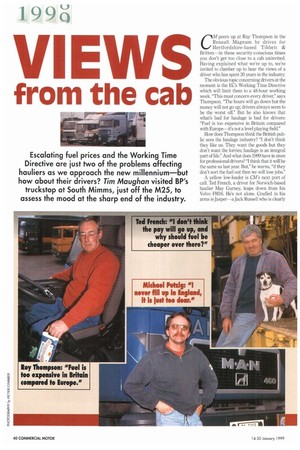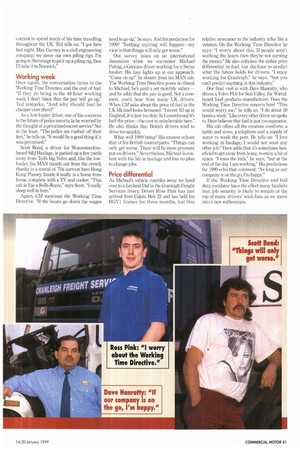from the cab
Page 42

Page 43

If you've noticed an error in this article please click here to report it so we can fix it.
Escalating fuel prices and the Working Time Directive are just two of the problems affecting hauliers as we approach the new millennium—but how about their drivers? Tim Maughan visited BP's truckstop at South Mimms, just off the M25, to assess the mood at the sharp end of the industry.
peers up at Ray Thompson in the Renault Magnum he drives for Hertfordshire-based Tibbett 8z Britten—in these security-conscious times you don't get too close to a cab uninvited. Having explained what we're up to, we're invited to clamber up to hear the views of a driver who has spent 20 years in the industry.
The obvious topic concerning drivers at the moment is the EC's Working Time Directive which will limit them to a 48-hour working week "This must concern every driver," says Thompson. "The hours will go down but the money will not go up; drivers always seem to be the worst off." But he also knows that what's bad for haulage is bad for drivers: "Fuel is too expensive in Britain compared with Europe—it's not a level playing field."
How does Thompson think the British public sees the haulage industry? "I don't think they like us. They want the goods but they don't want the lorries; haulage is an integral part of life." And what does 1999 have in store for professional drivers? I think that it will be the same as last year. But," he warns, "if they don't sort the fuel out then we will lose jobs."
A yellow low-loader is CM's next port of call. Ted French, a driver for Norwich-based haulier May Gurney, leaps down from his Volvo FH16. He's not alone. Cradled in his
arms is Jasper a Jack Russell who is clearly content to spend much of his time travelling throughout the UK. Ted tells us: "I got here last night. May Gurney is a civil engineering company; we move our own piling rigs. I'm going to Stevenage to pick up a piling rig, then take it to Norwich."
Working week
Once again, the conversation turns to the Working Time Directive and the cost of fuel. "If they do bring in the 48-hour working week I don't think that the pay will go up," Ted remarks. "And why should fuel be cheaper over there?"
As a low-loader driver, one of his concerns is the future of police escorts. Is he worried by the thought of a privatised escort service? Not in the least. "The police are rushed off their feet," he tells us. "It would be a good thing if it was privatised."
Scott Bond, a driver for Worcestershirebased S&J Haulage, is parked up a few yards away from Ted's big Volvo and, like the lowloader, his MAN stands out from the crowd, thanks to a mural of '70s cartoon hero Hong Kong Phooey. Inside it really is a home from home, complete with a TV and cooker. "This cab is like a Rolls-Royce," says Scott. "I really sleep well in here."
Again, CM mentions the Working Time Directive. "If the hours go down the wages
need to go up," he says. And his prediction for 1999? "Nothing exciting will happen—my view is that things will only get worse."
Our survey takes on an international dimension when we encounter Michael Putzig, a German driver working for a Swiss haulier, His face lights up at our approach. "Come on up?" he shouts from his MAN cab. The Working Time Directive poses no threat to Michael; he's paid a set monthly salary— and he adds that the pay is good. Not a comment you'd hear from many UK drivers, When CM asks about the price of fuel in the UK Michael looks bemused: "I never fill up in England, it is just too dear. In Luxembourg it's half the price—the cost is unbelievable here." He also thinks that British drivers tend to drive too quickly.
What will 1999 bring? His answer echoes that of his British counterparts: "Things can only get worse. There will be more pressure put on drivers." Nevertheless, Michael is content with his life in haulage and has no plan to change jobs.
Price differential
As Michael's vehicle rumbles away we head over to a Leyland Daf in the Cranleigh Freight Services livery. Driver Ross Pink has just arrived from Calais He's 23 and has held his HGV1 licence for three months, but this relative newcomer to the industry talks like a veteran. On the Working Time Directive he says: "I worry about this. If people aren't working the hours then they're not earning the money." He also criticises the unfair price differential in fuel, but declines to predict what the future holds for drivers. "I enjoy working for Cranleigh," he says, "but you can't predict anything in this industry."
Our final visit is with Dave Hanratty, who drives a Volvo FL6 for Sun Valley, the Wirralbased food products manufacturer. Does the Working Time Directive concern him? "This would worry me," he tells us. "I do about 50 hours a week." Like every other driver we spoke to, Dave believes that fuel is just too expensive.
His cab offers all the creature comforts: a kettle and stove, a telephone and a supply of water to wash the pots. He tells us: "I love working in haulage, I would not want any other job." Dave adds that it's sometimes beneficial to get away from home, to enjoy a bit of space. "I miss the kids," he says, "but at the end of the day I am working." His predictions for 1999 echo that comment: "As long as our company is on the go, I'm happy."
If the Working Time Directive and fuel duty escalator have the effect many hauliers fear, job security is likely to remain at the top of many drivers' wish lists as we move into a new millennium.








































































































